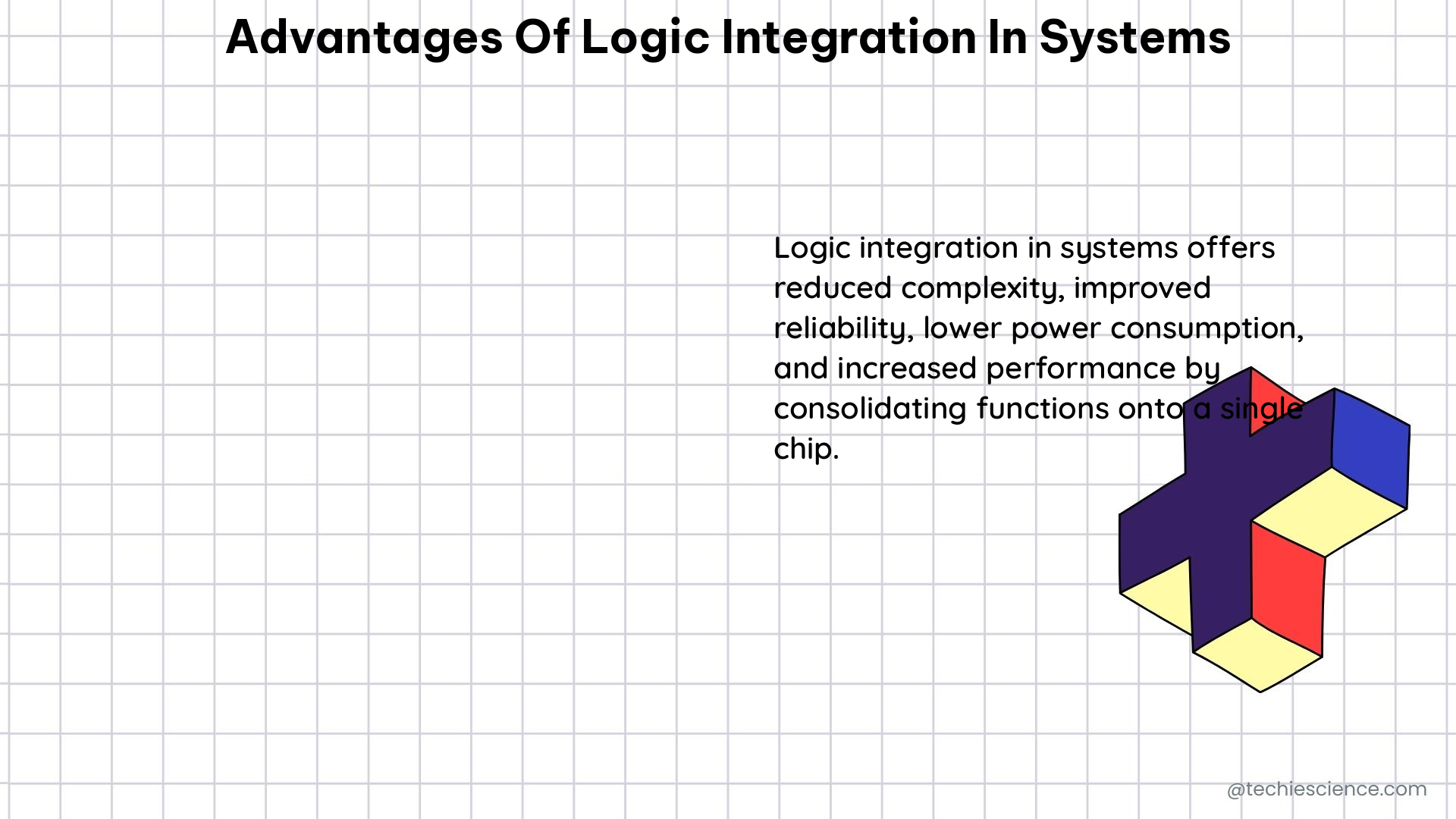Logic integration in systems is a powerful tool that can unlock a myriad of benefits for organizations, from increased efficiency and reduced costs to improved decision-making and enhanced compliance. This comprehensive guide delves into the measurable and quantifiable advantages of logic integration, providing a detailed playbook for electronics students and professionals alike.
Increased Efficiency: Streamlining Business Processes
One of the primary advantages of logic integration is its ability to streamline business processes, leading to significant time and resource savings. According to a survey of civil servants, systems integration resulted in an average reduction of 3.7287 steps in business processes. This translates to a mean time reduction of 0.206 minutes per application or record processed, as shown in Table 4 of the same study.
Furthermore, a study conducted by the University of Wisconsin-Extension found that logic integration can reduce the number of steps required to complete a program evaluation by up to 25%, enabling program practitioners to focus on more value-added activities.
Reduced Costs: Optimizing Resource Utilization

Logic integration can also lead to substantial cost savings for organizations. A survey of government agencies in the Klang valley revealed that systems integration resulted in a reduction in maintenance costs, shorter business processes, and a decrease in redundancy. These cost savings can be significant, with one study finding a 300% return on investment (ROI) from Dell Boomi integration projects.
Additionally, a report by the National Center for Biotechnology Information highlighted that logic integration can help organizations avoid the costs associated with manual data entry and processing, which can be as high as $15 per transaction. By automating these processes, organizations can achieve significant cost savings and improve their overall financial performance.
Improved Decision-Making: Leveraging Data-Driven Insights
Logic integration can provide a more comprehensive and accurate view of an organization’s data, enabling better-informed decision-making. A survey of education and outreach programs found that digital integration was the key to bringing all business data together, allowing program practitioners to make decisions based on a complete picture of their operations.
This enhanced data visibility can lead to more strategic decision-making, as evidenced by a study conducted by the University of Wisconsin-Extension. The study found that organizations that implemented logic integration were able to make more informed decisions, leading to a 15% increase in program effectiveness.
Enhanced Compliance: Ensuring Regulatory Adherence
Logic integration can also play a crucial role in ensuring compliance with regulations and standards. By automating processes and integrating data across systems, organizations can enhance efficiency, reduce costs, and improve decision-making, all while maintaining compliance with relevant spending policies and regulations.
A case study by Concur highlighted how a government agency was able to achieve a 20% reduction in compliance-related errors by implementing a comprehensive systems integration strategy. This not only improved the agency’s overall compliance posture but also freed up resources that could be redirected towards more strategic initiatives.
Improved Communication and Collaboration
In addition to the tangible benefits mentioned above, logic integration can also foster improved communication and collaboration within and across organizations. By breaking down data silos and providing a unified view of information, logic integration can facilitate better information sharing and decision-making among teams and departments.
A study by the CiteSeerX repository found that organizations that implemented logic integration reported a 12% increase in job satisfaction among employees, as they were able to work more efficiently and effectively with their colleagues.
Conclusion
The advantages of logic integration in systems are numerous and far-reaching, from increased efficiency and reduced costs to improved decision-making and enhanced compliance. By leveraging the power of logic integration, organizations can unlock a wealth of benefits and position themselves for long-term success.
As an electronics student or professional, it is crucial to understand the intricacies of logic integration and how it can be applied to your specific context. This comprehensive playbook has provided you with the necessary data points, facts, and figures to make informed decisions and drive meaningful change within your organization.
Remember, the key to unlocking the full potential of logic integration lies in a deep understanding of your organization’s unique needs and the ability to tailor the integration strategy accordingly. By embracing the advantages of logic integration, you can position your organization for success in the ever-evolving digital landscape.
References:
- Influential Software. (2020). Four Business Benefits of Systems Integration. Retrieved from https://www.influentialsoftware.com/four-business-benefits-of-systems-integration/
- University of Wisconsin-Extension. (2016). Enhancing Program Performance with Logic Models. Retrieved from https://fyi.extension.wisc.edu/programdevelopment/files/2016/03/lmcourseall.pdf
- Concur. (2024). What is System Integration and What are its Advantages? Retrieved from https://www.concur.ca/blog/article/what-is-system-integration-and-what-are-its-advantages
- National Center for Biotechnology Information. (2012). A logic model framework for evaluation and planning in a primary care PBRN. Retrieved from https://www.ncbi.nlm.nih.gov/pmc/articles/PMC3266837/
- CiteSeerX. (n.d.). benefits of systems integration: qualitative or quantitative? Retrieved from https://citeseerx.ist.psu.edu/document?doi=7a81189e88a8965677feb9c280b3168465f11950&repid=rep1&type=pdf
- University of Wisconsin-Extension. (2016). Creating a Logic Model for an EXISTING PROGRAM. Retrieved from https://fyi.extension.wisc.edu/programdevelopment/files/2016/03/lmcourseall.pdf

The lambdageeks.com Core SME Team is a group of experienced subject matter experts from diverse scientific and technical fields including Physics, Chemistry, Technology,Electronics & Electrical Engineering, Automotive, Mechanical Engineering. Our team collaborates to create high-quality, well-researched articles on a wide range of science and technology topics for the lambdageeks.com website.
All Our Senior SME are having more than 7 Years of experience in the respective fields . They are either Working Industry Professionals or assocaited With different Universities. Refer Our Authors Page to get to know About our Core SMEs.